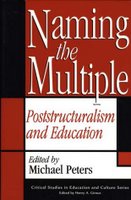Poststructuralism & Education
 This book (Peters, M. (1998) Naming the Multiple: Poststructuralism and Education, Bergin & Garvey) is helping me appropriate the insights of poststructuralism for higher education, executive education and networked learning. I've found a (long) quote (pp.12-13) that summaries the broad categories of application that Micheal Peters attributes to the French reception (largely Deleuzian) of Nietzsche:
This book (Peters, M. (1998) Naming the Multiple: Poststructuralism and Education, Bergin & Garvey) is helping me appropriate the insights of poststructuralism for higher education, executive education and networked learning. I've found a (long) quote (pp.12-13) that summaries the broad categories of application that Micheal Peters attributes to the French reception (largely Deleuzian) of Nietzsche:"These Nietzschean philosophemes (emphasis in original) serve as a reference point for education theorists in seeking both to understand and to appropriate the insights of poststructuralism. The also serve as an interpretive basis for detecting and tracing the influence of poststructuralism in much recent educational theorizing: the critique of the Enlightenment subject of both liberal and Marxist perspectives, with the attendant development of more complex notions of student and teacher subjectivities; the challenge to simple-minded accounts of automony and agency; the reappraisals of models of interpretations of texts andtheir relations to various contexts - social, cultural, institutional, pedagogical; the reassessment of and consequent richer notions of reading and writing, considered as social practices; the intimate connections between power and knowledge in, for instance, not only classroom settings but also constructions of educational policies and the development of new pedagogical practices; the greater attention paid to the discursive power of "the languages of education" - those of educational administration, economics, management, measurement, and policy - in the constitution of education in the broadest sense; the utilisation, in innovative ways, of forms of discourse analysis, deconstruction, archaeology, and genealogy as new means of analysis of educational institutions, practices, and policies; both an awareness and a political suspicion of the new communications and information technologies as, in part, the means for achieving globally what has been referred to as the information society, knowledge society, or information superhighway; the emphasis on notions and principles of becoming and process over questions of being and ontology in understanding educational practices; the critique of binary modes of thinking per se; the rehabilitation of desire as a set of cultural and educational forces; the acknowledgement of forces acting upon forces, indivduals, and groups within educational settings; and the investigation and acknowledgement of the notion of difference, in its various conceptual manifestations, operating as a set of complext sociocultural and educational principles."


0 Comments:
Post a Comment
<< Home